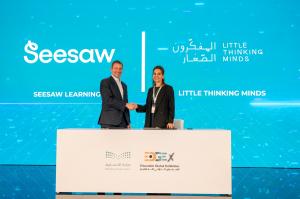Seesaw Acquires MENA-based Edtech Startup Little Thinking Minds to Expand Learning Solutions Globally
Seesaw Acquires MENA-based Edtech Startup Little Thinking Minds to Expand Learning Solutions Globally
Seesaw offers a suite of award-winning interactive and AI-driven learning tools and digital curriculum products designed to enhance student engagement, facilitate real-time assessments, and strengthen school-home communication. With this acquisition, Seesaw will combine its interactive technology with Little Thinking Minds’s evidence-based Arabic literacy curricula and assessment solutions in order to transform learning for PreK-12 students, educators, and families in the MENA region and beyond. In addition to its comprehensive solution set for American and British schools, Seesaw will launch its first Arabic-language platform in 2026, reinforcing its commitment to authentic and multilingual learning experiences.
Together, the two companies will enable educators to create joyful, inclusive, and personalized learning experiences, ensuring that every student is supported throughout their academic journey. Ministries and school leaders will benefit from data-driven insights through Seesaw’s interactive dashboards and student portfolios, offering a clearer view of student progress and learning outcomes.
.
“This partnership marks a major step in our mission to create engaging and effective learning experiences for students worldwide,” said Matthew Given, CEO of Seesaw. “Little Thinking Minds has built a strong reputation and effective products for improving Arabic literacy, and by joining forces, we can empower more students and teachers with localized, high-impact learning solutions.”
Founded in 2004, Little Thinking Minds is a pioneering edtech startup dedicated to closing the literacy gap for Arabic-speaking students worldwide, with a strong focus on the MENA region. Through its platforms—I Read Arabic, I Start Arabic, and the Mizan Assessment Platform—the company has empowered over 400,000 students across 10+ countries with evidence-based digital literacy solutions. Backed by independent research, LTM’s programs have demonstrated a 25% improvement in literacy levels and are trusted by public and private schools, refugee education programs, and government initiatives to deliver measurable outcomes.
Little Thinking Minds has established itself as one of the strongest edtech startups in the region, successfully attracting investors and securing significant funding. In 2018, the company raised a Series A investment led by Algebra Ventures, with participation from Mindshift Capital, Al Turki Ventures and the ISSF Fund. This funding — along with support from early investors including the Women’s Angel Investor Network (WAIN) and Oasis500 — allowed Little Thinking Minds to scale its platform, expand its reach, and further develop its Arabic literacy solutions, solidifying its role as a leader in the MENA edtech ecosystem.
“We’re incredibly proud to be joining the Seesaw family,” said Rama Kayyali, co-founder and CEO of Little Thinking Minds. “As the leading Arabic language K-12 edtech in the region—with curriculum alignment across most Arab countries, a strong footprint in both public and private schools, and pioneering research and development in AI for Arabic literacy—this milestone represents a powerful next step in our mission. Together with Seesaw, we’re poised to scale our impact even further, delivering cutting-edge, culturally relevant learning experiences that empower children across the MENA region and beyond.”
This acquisition – originated with EDT&Partners – is a significant development in the MENA edtech ecosystem, reinforcing Seesaw’s commitment to multilingual education and expanding its reach into Arabic-speaking markets. Seesaw and Little Thinking Minds currently serve over 800,000 users at over 3,000 schools, ministries, and school groups in the MENA region and will now look to rapidly expand their global reach with their combined solution set.
For More Info
Communications
email us here
Legal Disclaimer:
EIN Presswire provides this news content "as is" without warranty of any kind. We do not accept any responsibility or liability for the accuracy, content, images, videos, licenses, completeness, legality, or reliability of the information contained in this article. If you have any complaints or copyright issues related to this article, kindly contact the author above.
Protection Tax Helps Clients Resolve Unfiled Returns Before IRS Action Escalates
leagend T31 Sets New Standard for Affordable and Accurate OBD II Diagnostics
Couple Opens Unique '432Hz' Live Music Sanctuary on Spain's Costa del Sol for Summer Vibes and Son Awareness
Kalendarium
Więcej ważnych informacji
 Jedynka Newserii
Jedynka Newserii

 Jedynka Newserii
Jedynka Newserii

Handel

Ze względu na różnice w cenach surowce wtórne przegrywają z pierwotnymi. To powoduje problemy branży recyklingowej
Rozporządzenie PPWR stawia ambitne cele w zakresie wykorzystania recyklatów w poszczególnych rodzajach opakowań. To będzie oznaczało wzrost popytu na materiały wtórne pochodzące z recyklingu. Obecnie problemy branży recyklingu mogą spowodować, że popyt będzie zaspokajany głównie przez import. Dziś do dobrowolnego wykorzystania recyklatów nie zachęcają przede wszystkim ceny – surowiec pierwotny można kupić taniej niż ten z recyklingu.
Przemysł spożywczy
Rośnie presja konkurencyjna na unijne rolnictwo. Bez rekompensat sytuacja rolników może się pogarszać

Rolnictwo i żywność, w tym rybołówstwo, są sektorami strategicznymi dla UE. System rolno-spożywczy, oparty na jednolitym rynku europejskim, wytwarza ponad 900 mld euro wartości dodanej. Jego konkurencyjność stoi jednak przed wieloma wyzwaniami – to przede wszystkim eksport z Ukrainy i niedługo także z krajów Mercosur, a także presja związana z oczekiwaniami konsumentów i Zielonym Ładem. Bez rekompensat rolnikom może być trudno tym wyzwaniom sprostać.
Transport
Infrastruktury ładowania elektryków przybywa w szybkim tempie. Inwestorzy jednak napotykają szereg barier

Liczba punktów ładowania samochodów elektrycznych wynosi dziś ok. 10 tys., a tempo wzrostu wynosi ok. 50 proc. r/r. Dynamika ta przez wiele miesięcy była wyższa niż wyniki samego rynku samochodów elektrycznych, na które w poprzednim roku wpływało zawieszenie rządowych dopłat do zakupu elektryka. Pierwszy kwartał br. zamknął się 22-proc. wzrostem liczby rejestracji w ujęciu rocznym, ale kwiecień przyniósł już wyraźne odbicie – o 100 proc.
Partner serwisu
Szkolenia

Akademia Newserii
Akademia Newserii to projekt, w ramach którego najlepsi polscy dziennikarze biznesowi, giełdowi oraz lifestylowi, a także szkoleniowcy z wieloletnim doświadczeniem dzielą się swoją wiedzą nt. pracy z mediami.









.gif)

 |
| |
| |
|